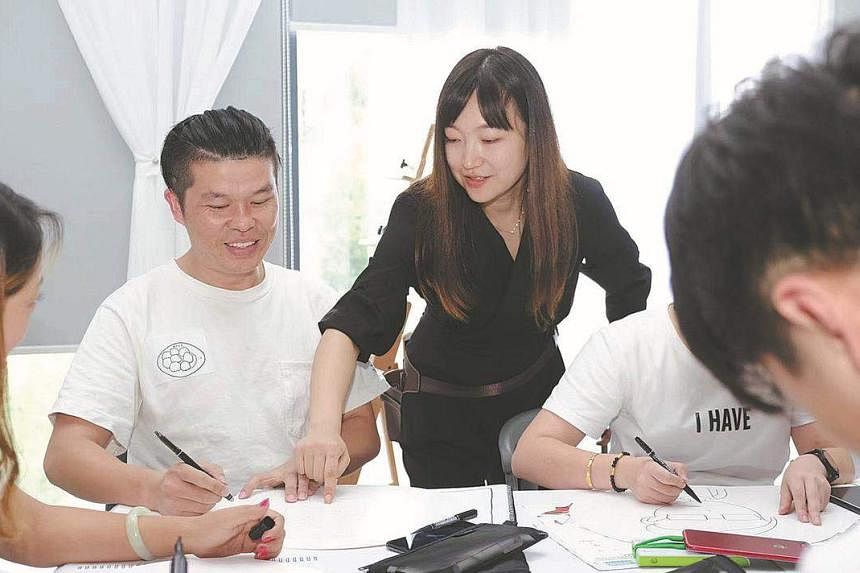BEIJING - Many Chinese workers, especially the young, are opting to leave the traditional job market to pursue more flexible employment opportunities.
The majority of them do so after working for five to 10 years, according to a report released last year by Maimai, a social networking app for office employees, and Xigua Video, an online video service provider.
Human resources director Su Lan who is based in Hangzhou, Zhejiang province, said: “Young people nowadays have less financial pressure than those born in the 1970s and 1980s, as they grow up in a more open-minded society with more access to information. As a result, they have greater freedom to make their own decisions.”
For some, the career switch was a move spurred by impulse.
After breaking up with her boyfriend, Ms Tang Xue, 24, resigned from her job six months ago to buy a farm in Anji county, Zhejiang. She was attracted by the prospect of working in the open air, escaping stressful urban life, making new friends, and finding the ideal lifestyle.
“I believe it is important to do things on impulse sometimes, as I did earlier this year. I chose to take control of my own destiny without worrying about becoming trapped in a meaningless job,” said Ms Tang, who worked for three short-video platforms in Hangzhou after graduating from a university in Hunan province in 2019.
“I thought that changing the course of my life might pose a risk, but I was willing to take it. It is never too late to restart my career, as I am a smart person with excellent abilities,” said Ms Tang, who worked at a farm in Jinhua, Zhejiang, for a few months before buying her own in Anji earlier this year.
Her small farm covers 1.3ha and boasts a 160 sq m courtyard. She plans to run the farm as a “shared vegetable field” project, with customers ordering the produce she grows.
According to a survey on luo ci, or “naked resignation” – a Chinese buzzword for quitting a job before finding the next one – released last year by 51Job, one of the biggest human resource service companies in China, the two main reasons for such resignations are too much pressure and boring work.
Heavy schedule
Mr Shen Yiming, 28, who left his job in 2020 after working in the tourism industry for more than three years, decided to take a break from the high-pressure work and uncertain career prospects.
“Although I made more than 30,000 yuan (S$5,780) a month if I performed well, I failed to see a future for myself, as I was swamped with work all day long. My income also fell sharply due to a slowdown in the industry,” said Mr Shen, who worked as a travel consultant in Hangzhou.
Initially, he was devoted to his work, becoming the leading consultant in his department due to his ability to draw up popular travel plans. But the relentless high-pressure work schedules forced Mr Shen to rethink his career.
He decided to do something he enjoyed. As he was fond of travelling and writing travel blogs in his spare time, Mr Shen spent 12 months journeying throughout China last year on his savings, while continuing to earn money by working on cultural and tourism projects as a freelancer.

“I always bear in mind that if I run out of money, or if things don’t go as planned, I still have the ability to find a job again and become one of the best-performing employees in the sector,” he said.
At the end of last year, he created an account on Xiaohongshu, a life-sharing platform, and now has more than 300,000 followers for his travel blogs. He claimed to earn about 100,000 yuan per month.
Greater tolerance
As employees’ attitudes towards work change, along with increasingly diversified employment methods in different industries, new forms of flexible employment are emerging.
Workers want flexibility in where, when and how they are employed. Since 2019, there has been an 83 per cent rise in the number of job posts mentioning “flexibility”, according to LinkedIn’s Global Talent Trends Report issued in January. On individual companies’ LinkedIn profiles, references to “flexibility” in posts rose by 343 per cent over the same period.
Sociology professor Yu Hai at Shanghai’s Fudan University said: “Traditional forms of employment have diversified in these fast-changing times, while society is showing greater tolerance for newly emerging occupations.”
According to latest data from the National Bureau of Statistics, by the end of last year, the number of workers in flexible employment in China reached 200 million — more than 1.6 million of them in livestreaming and other forms of new media, nearly a threefold year-on-year rise.
Some college graduates, like Ms Lu Sina, 28, chose to become self-employed after graduation.

Ms Lu, who lived in Hangzhou, launched a travel agency with a friend after graduating from Sichuan Conservatory of Music in 2016 with a major in culture industry management.
Short of social experience and long-range planning, Ms Lu found running the small business too difficult and exhausting. She left the agency in 2018 and moved from job to job before becoming a voluntary teacher at a Chinese school in Thailand.
However, she started to worry about herself when she saw her former university classmates getting job promotions, earning high salaries, buying property, and getting married.
Armed with what she learnt from courses she took and her voluntary work experience, she returned to Hangzhou in 2019 to work as operations supervisor for a domestic maternal and infant products brand.
However, after working at the company for two years, she decided to pursue flexible employment again and resigned from the company in March with 300,000 yuan in her savings account.
To be self-disciplined while working on her own, Ms Lu carefully plans her daily schedule. “I want to manage myself as a company,” she said.
Ms Lu currently works three days a week as an independent operations consultant and career planner, earning 15,000 yuan a month on average.
Tough prospects
Ms Lin Xiaobai, 36, from Chengdu, capital of Sichuan province, majored in business administration at Chengdu University, graduating in 2008. She took up human resources jobs at several companies in different cities before ending up at a bank in Nanchong, Sichuan. She left the company in 2014.

“A few months after I started working at the bank, I realised it was not the life for me. I wanted to quit this boring and stressful work, even though I was earning a good salary,” said Ms Lin, who went through an unhappy divorce during this period.
She tried launching a creative design space selling collectibles in Suzhou in 2014, and also a studio in Sichuan for children to learn to draw, sew, and make handicrafts and clay figures. She also launched a creative talent education programme with a partner. All these projects failed, as Ms Lin kept losing money and incurring debts.
She described herself as a person full of ideological thoughts at that time, but without any business plan or management experience.
“Working on your own requires an extremely strong mind. You have to break out of your comfort zone, challenge the limit of your potential, and have the strength to make many risky decisions,” said Ms Lin, a single mother.
She eventually drew inspiration from her interest in drawing, a skill she acquired a number of years ago.
Ms Lin, who draws stick figures to express her feelings and views of daily life, now has more than 400,000 followers on Xiaohongshu, and regularly cooperates with corporate brands.
In 2020, she launched online training courses to teach beginners to record their daily lives through drawing, attracting 1,000 participants. Today, she begins each day with one hour of exercise followed by four hours of work.
Prof Yu said: “People often decide to leave the traditional job market without planning their next move. This change in working patterns among the younger generation is irreversible and will have a profound impact on flexible employment in the future.” CHINA DAILY/ASIA NEWS NETWORK

